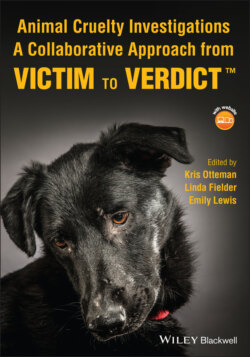Читать книгу Animal Cruelty Investigations - Группа авторов - Страница 3
List of Illustrations
Оглавление1 Chapter 2Figure 2.1 Feed requirements for cattle and other hoofstock can be calculate...Figure 2.2 Community cats may be tame or unsocialized and often live in colo...Figure 2.3 Tight collars may become embedded in an animal's skin causing pai...Figure 2.4 Angora rabbits require regular grooming to prevent matting of the...Figure 2.5 Captive birds may develop feather picking behaviors owing to stre...Figure 2.6 Inadequate lighting and heat in reptile enclosures can lead to sk...Figure 2.7 Animals in a weakened or debilitated state require veterinary car...
2 Chapter 3Figure 3.1 The shelter pictured here does little to provide protection from ...Figure 3.2 The multiple wounds and abscesses on the dog in this photo can be...Figure 3.3 Contaminated food and water pose health risks to animals.Figure 3.4 Animals require additional feed and calories when pregnant or nur...Figure 3.5 Documentation of the environment through accurate notes, photogra...Figure 3.6 Photos should accurately represent the animal's body condition....Figure 3.7 Many animals, such as the pot‐bellied pig in this photo, require ...Figure 3.8 Examine medication closely for prescription information, expirati...Figure 3.9 There is a well‐established link between animal abuse and other v...
3 Chapter 4Figure 4.1 Many reports concern animals living in inadequate conditions that...Figure 4.2 The number of cats in this window offers a glimpse into condition...Figure 4.3 Notices should be easy to read and posted in a conspicuous place....Figure 4.4 Understand what the laws in your state specify about providing em...
4 Chapter 6Figure 6.1 The veterinarian’s role includes evaluation of the behavioral and...Figure 6.2 The forensic veterinarian’s role includes examining physical evid...Figure 6.3 Evaluating overall animal husbandry and access to veterinary care...Figure 6.4 Veterinarians assist in ruling in or out the reported causes of i...
5 Chapter 7Figure 7.1 Evaluating photos of animals and their environment is an essentia...Figure 7.2 Thorough and well‐documented examination of all evidence is the f...Figure 7.3 Take multiple views of significant findings. In this case the dog...Figure 7.4 This photo clearly depicts how loose the dog’s collar has become ...Figure 7.5 Far‐range photos demonstrate the overall location and scale of a ...Figure 7.6 Mid‐range photos provide context and detail.Figure 7.7 Close‐up photos reveal details that are not visible in other view...Figure 7.8 Collect multiple views when photographing animals. This photograp...Figure 7.9 The aerial view of this dog clear demonstrates her emaciated cond...Figure 7.10 Radiographs reveal unsuspected findings that are relevant, such ...Figure 7.11 Hands‐on body condition scoring is a valuable tool for most spec...Figure 7.12 Evidence gathered from feet or claws can contain important detai...Figure 7.13 Approach selection of additional diagnostic tests efficiently....Figure 7.14 Radiographic density as demonstrated via imaging may illustrate ...
6 Chapter 8Figure 8.1 Many cases can be resolved through education and compliance monit...Figure 8.2 Subsidized programs that provide spay/neuter and veterinary care ...Figure 8.3 Compliance notices are a useful way to communicate instructions f...Figure 8.4 Animal hoarding cases are complex, resource intensive, and best a...Figure 8.5 Animal hoarding cases may involve any species or variety of speci...
7 Chapter 9Figure 9.1 Photos incorporated directly into the body of your affidavit help...Figure 9.2 Depending on the size of the property, using an aerial map instea...Figure 9.3 Once this identifier is attached, each photo or video series take...Figure 9.4 Identifying the animal and including the habitat in the photo pro...Figure 9.5 Using a habitat evaluation form ensures that the scene processing...
8 Chapter 10Figure 10.1 When investigating a rescue, collecting paperwork like this help...Figure 10.2 (a and b) Connecting ulcerated feet to a urine‐soaked enclosure,...Figure 10.3 (a–e) All of these areas may contain animal remains or other evi...Figure 10.4 This enclosure, and several others like it, were discovered in a...Figure 10.5 In hoarding cases locating and capturing animals can be complica...Figure 10.6 Laboratories have specific requirements for feed submission. Be ...Figure 10.7 (a and b) The dog in this case was assigned the unique evidence ...Figure 10.8 (a–f) Some animals can easily be connected with their evidence I...Figure 10.9 (a and b) The gray rabbit in the cage can be viewed in the envir...Figure 10.10 This dog's posture and demeanor provided the veterinarian in th...Figure 10.11 (a–h) In this series of photos the location is clearly marked w...Figure 10.12 (a) The evidence placard associated with this cat was photograp...Figure 10.13 This form tracks the chain of custody for a live animal. Every ...Figure 10.14 It can be easier to track chain of custody and monitor a popula...Figure 10.15 Attaching the evidence placard to the end of this pole permitte...
9 Chapter 11Figure 11.1 When possible, identify and train an assistant ahead of time. In...Figure 11.2 Supplies and equipment found in the animal's environment provide...Figure 11.3 These medications discovered on scene support the probability th...Figure 11.4 Start taking photographs upon receipt of the remains and continu...Figure 11.5 Collect far, mid, and close‐uprange photos in sequence to show a...Figure 11.6 Photos verify important procedures and demonstrate chain of cust...Figure 11.7 Use photography to illustrate and document specific findings. In...Figure 11.8 Hemorrhage into skin, tissues under the skin, and muscle results...Figure 11.9 Full‐body imaging provides the examiner with information about t...Figure 11.10 The use of a linear object can help trace the trajectory of pen...Figure 11.11 Describe and photograph the appearance of wound margins and ass...Figure 11.12 Collect measurements of wound dimensions prior to disrupting th...Figure 11.13 (a–c) The shape and appearance of wounds from thermal and chemi...
10 Chapter 12Figure 12.1 The circles were added to this radiograph in the veterinarian's ...
11 Chapter 13Figure 13.1 Protective Custody begins when the animal is removed from the sc...Figure 13.2 Critical evidence is discovered during the initial veterinary ex...Figure 13.3 In this photo, a secure warehouse is being prepared for the inta...Figure 13.4 Shelter staff and volunteers must be trained on important aspect...
12 Chapter 15Figure 15.1 A simplified depiction of the bond‐or‐forfeit process in Oregon....Figure 15.2 A simplified depiction of the bond‐or‐forfeit process in Washing...
